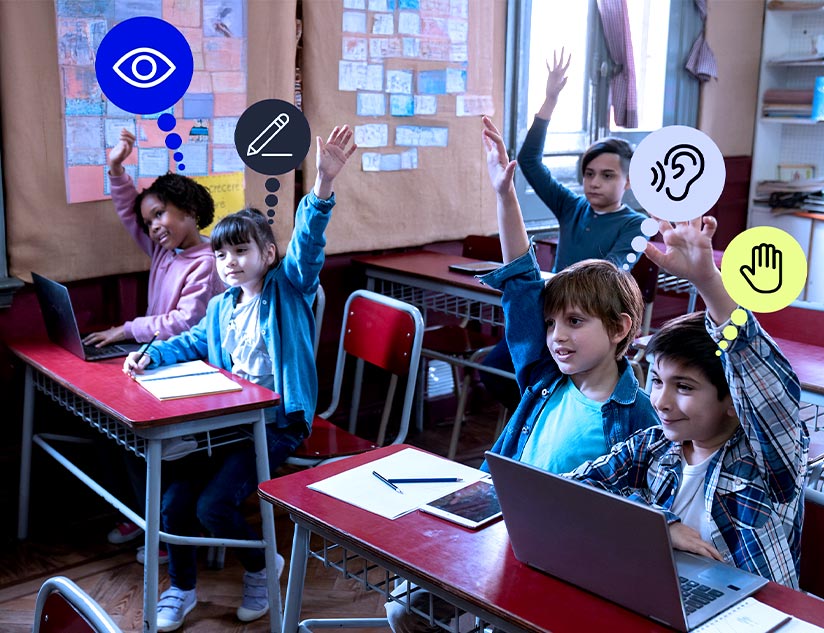Developing K-12 lesson plans is no mean feat even with digital educational publishing platforms. Online education is rapidly becoming multi-modal. With remote, hybrid, and continued learning paradigms penetrating deeper into the education sector, catering to diverse learners in their preferred format is a pervasive challenge. Further, eLearning models expand the addressable audience manifold with unique cultural and curricular requirements. Consequently, digital educational publishing is undergoing a massive transformation. AI-powered eLearning authoring tools can be a key differentiator for your publishing house, streamlining and easing content development.
Learn how AI-powered online course authoring tools can facilitate effortless development of standards-based learning resources.
Course Authoring Without AI-Powered Tools
Traditional content authoring platforms work on a one-size-fits-all approach. This becomes a bottleneck as the demand for personalized learning experiences rises. Static lesson progression, limited types and number of assessments, and fixed learning paths fail to meet the needs of accessible, inclusive, and equitable educational opportunities. Further, with a manual approach to developing courses, ensuring regulatory compliance and verifying alignment with state and national curriculum standards is tedious and time-consuming, while also being prone to human error. In addition, the slow process cannot keep up with the rapid transformation being witnessed by K12 publishing in the increasingly digital world. This is where leveraging AI in education and course development becomes critical.
AI-powered eLearning authoring tools address the shortcomings of legacy educational publishing platforms while offering multiple additional benefits.
AI-Powered eLearning Course Authoring Tools
AI models that power digital course authoring tools are vetted with exceptional learning materials, pedagogical models, and student data. These models can facilitate the use of AI in classrooms, remote settings, and educational development.
There are several advantages of AI in Education (AIEd), such as:
Enable Personalization
The global K-12 education market is shifting towards personalized and customizable textbooks. The most promising use of AI is in the customization of courses and personalization of learning materials to offer equitable, accessible, high-quality education to all students. Incorporating diverse formats, such as ePUB and audiobooks, is essential.
Ensure Compliance
AI facilitates the automation of routine and repetitive administrative tasks. For instance, AI-powered tools drive content tagging, curriculum alignment, and compliance with COPPA, FERPA, GDPR, etc. AI also speeds up the update processes to allow you to respond to changes in curriculum or regulations faster.
Leverage Analytics
AI-powered K-12 digital publishing platforms monitor student activity and progress. Teachers can use the insights from this data to improve instruction design and pedagogy. In fact, AI-powered eLearning authoring tools incorporate these recommendations in the course development process and aid in content quality improvement.
Drive Scalability
AI-powered translation tools and assistive technologies improve the scalability and adaptability of learning materials for learners with special (hearing impairment, vision issues) and specific needs (language barriers).
Infuse Agility
Another notable advantage of using an AI-powered digital content authoring platform is that the content development process and model remain agile. Agile eLearning authoring tools help K-12 educational publishers respond to dynamic market needs faster. AI in educational publishing can reduce the time to market giving you an edge over the competition.
Heighten Learning Achievement
AI enables immediate evaluation and feedback. Further, AI-powered assessments offer immediate actionables to allow learners to bridge learning gaps and improve academic achievement.
The Next Generation of Digital Course Authoring Tools
AI-powered eLearning authoring tools may present new opportunities in K12 publishing that facilitate the convergence of print and digital educational resources. Keeping pace with the evolving learning content authoring landscape is critical to stay relevant for the long term. Education, instructional design, assessments, and evaluations may never cease to evolve. AI can potentially redefine teacher-student, learner-learner, and learner-self relationships.
Education publishing houses must remain adaptive and agile to take their content creation and distribution processes to the next level. The key to doing so is adopting AI-powered eLearning course authoring tools equipped to facilitate seamless content authoring. An important aspect to take care of is to gauge the impact of technology integration on educators. Teachers must not feel that AI is yet another thing “to deal with,” but should be able to experience it as a companion they want to work with to make their lives easier. Simultaneously, ensuring compliance and adhering to state and federal standards can improve the chances of adoption.
Educational publishers must enable student-centric education and facilitate teachers to maximize learning outcomes. Augment your digital publishing platform with AI-powered eLearning authoring tools to stay at the forefront of the education revolution. Partnering with an experienced and reputed digital learning technologies provider can be a game-changer for your publishing house. Schedule a demo with MagicBox™ to learn how AI-powered content authoring platforms can streamline publishing and digital content distribution.
















